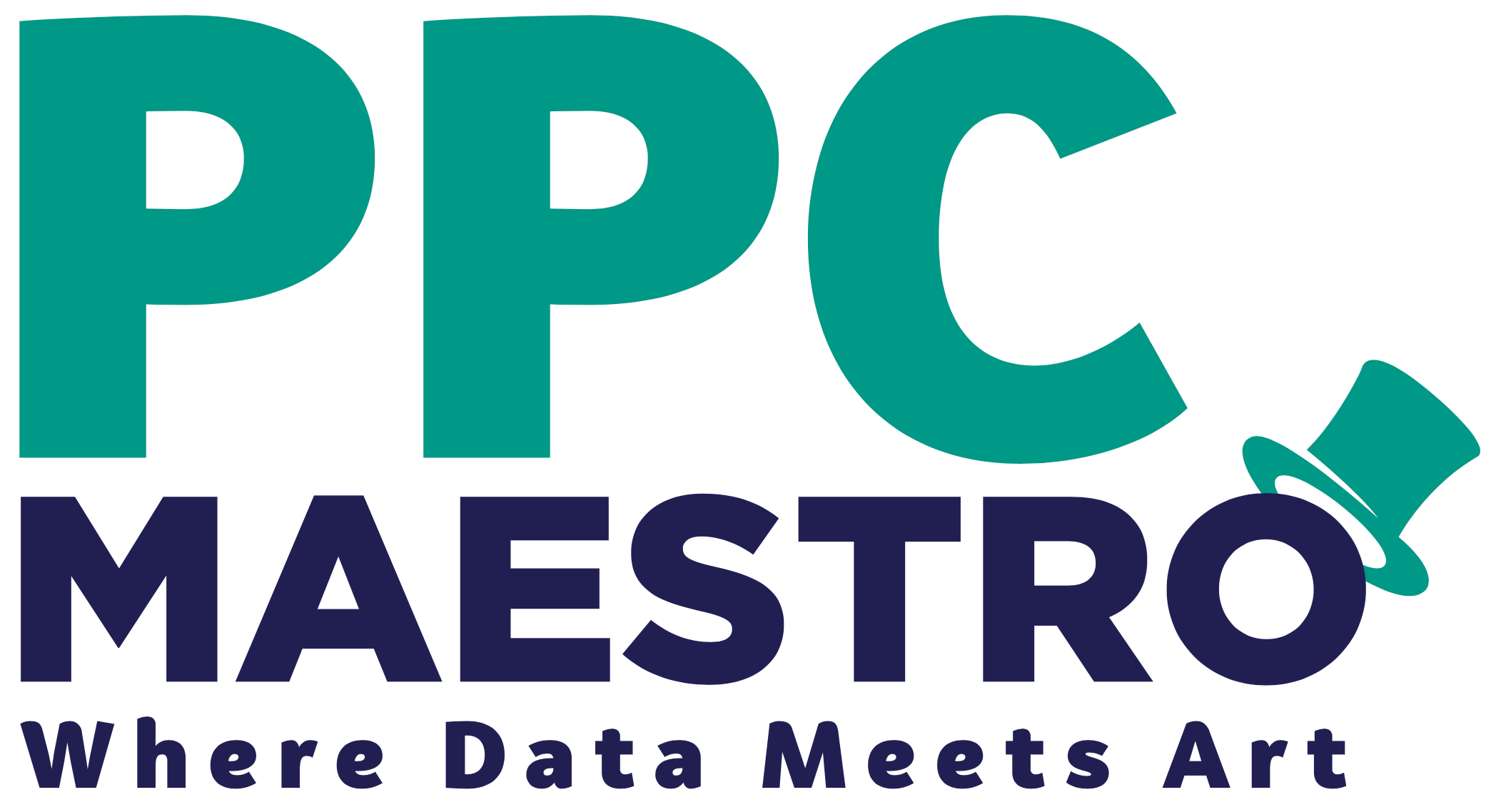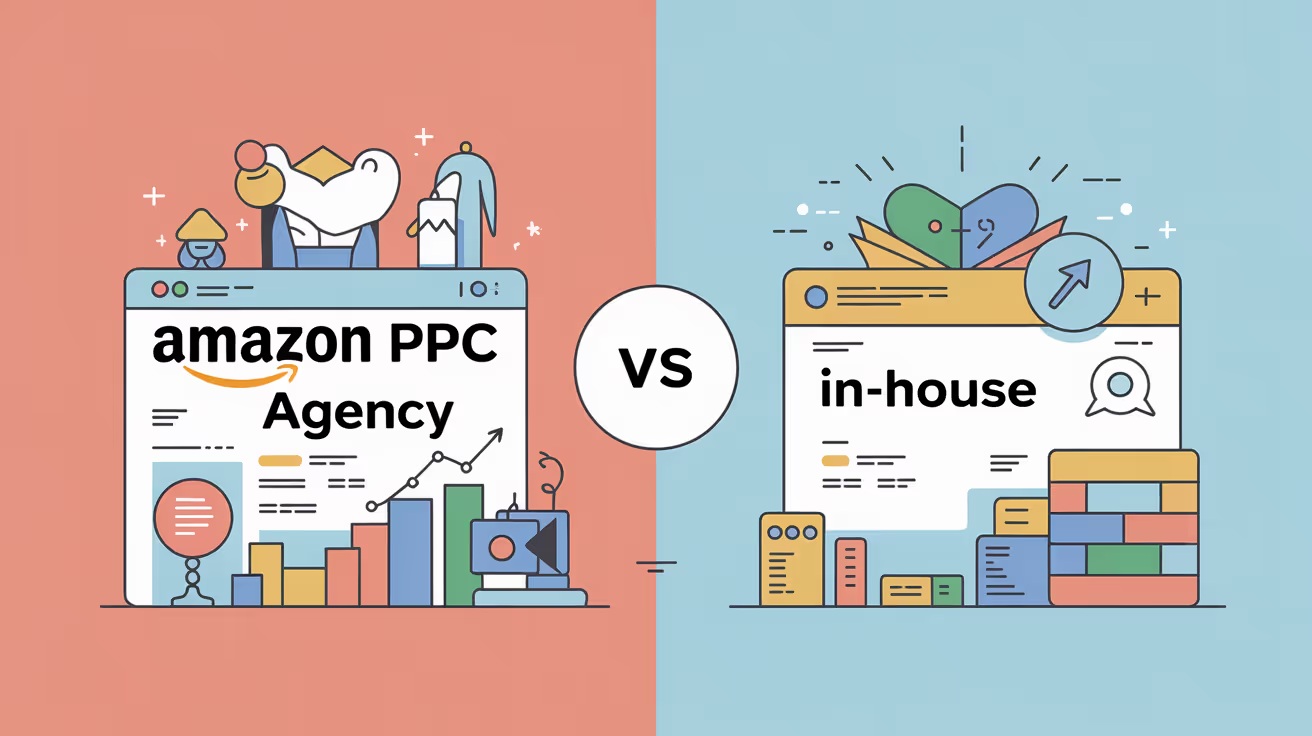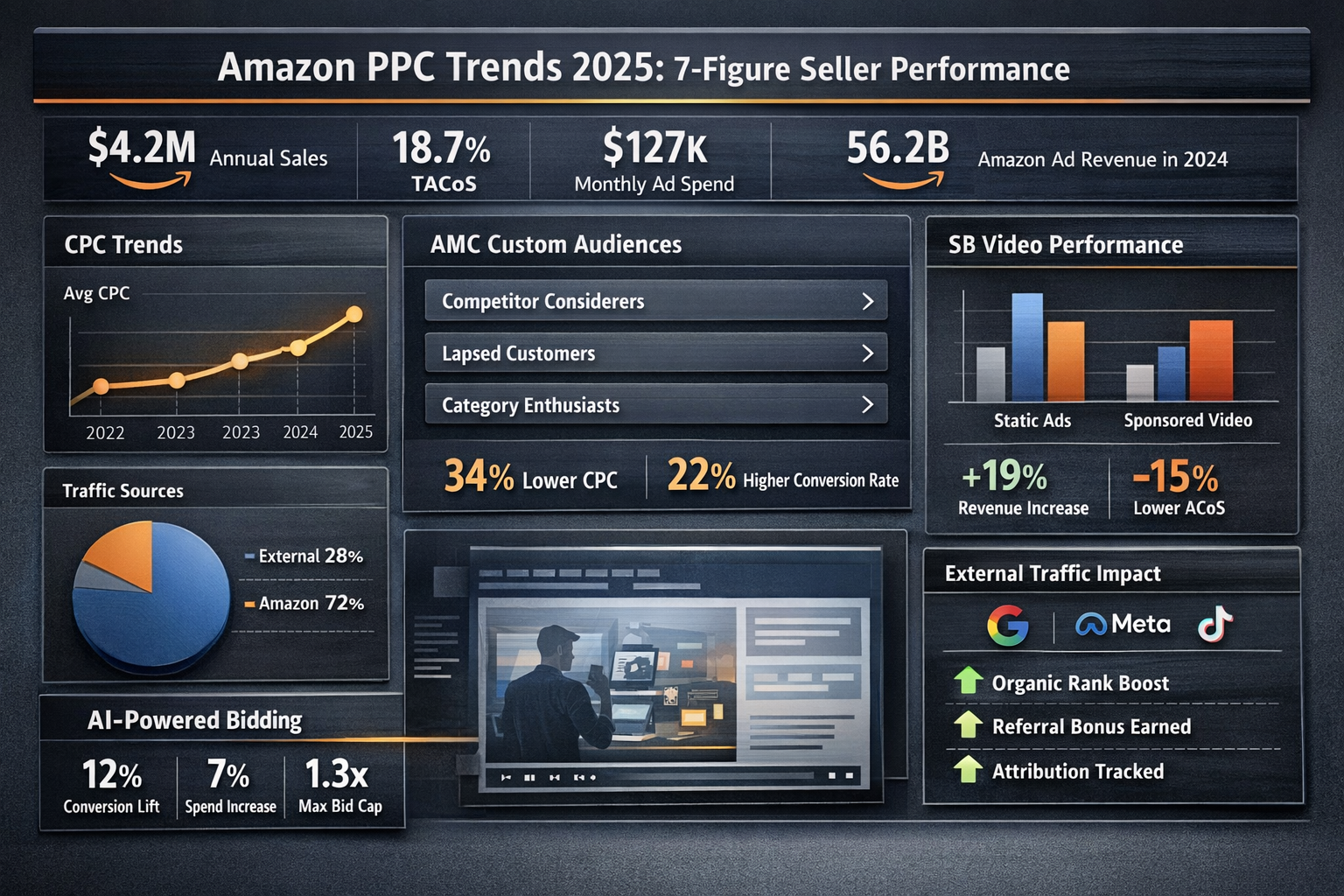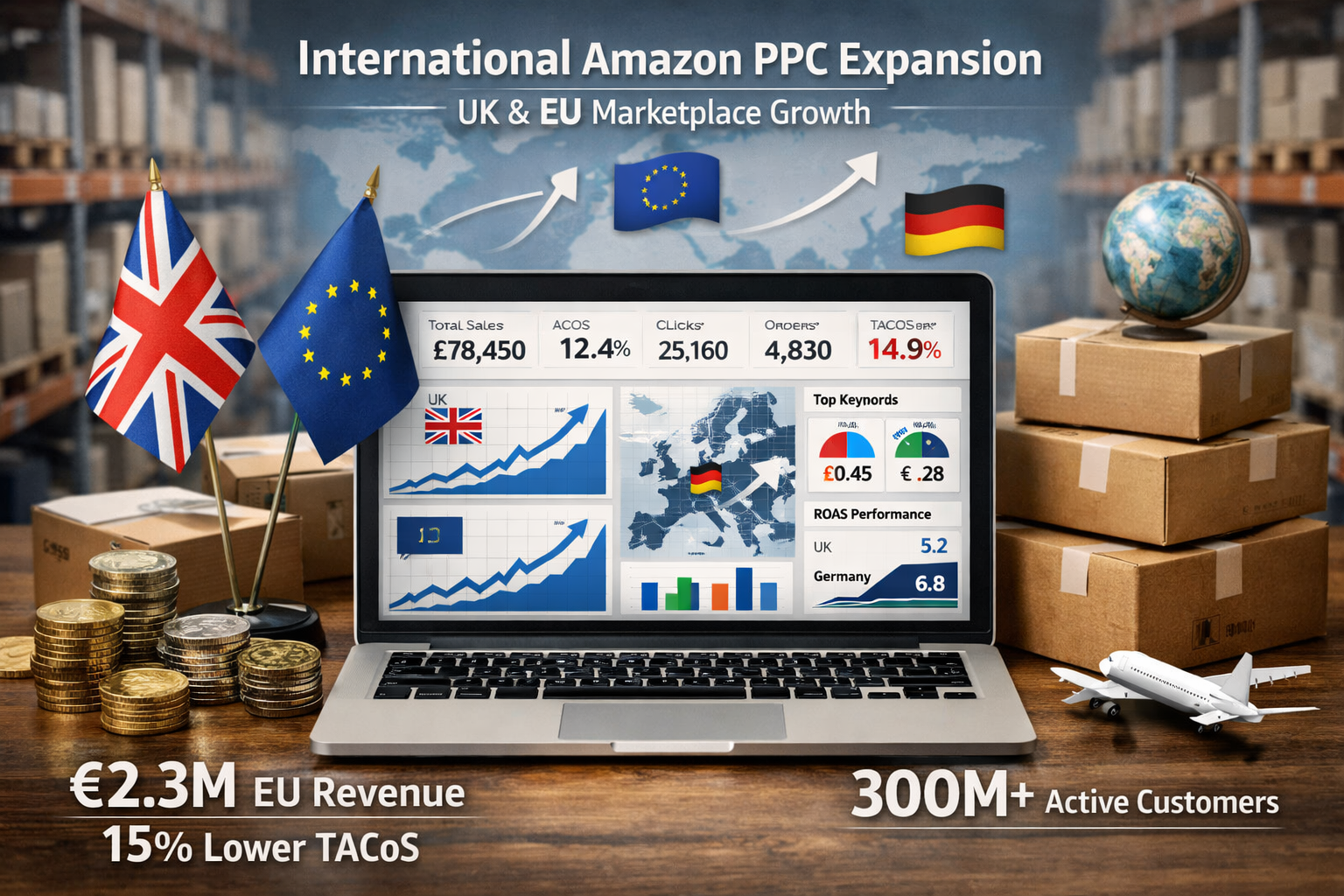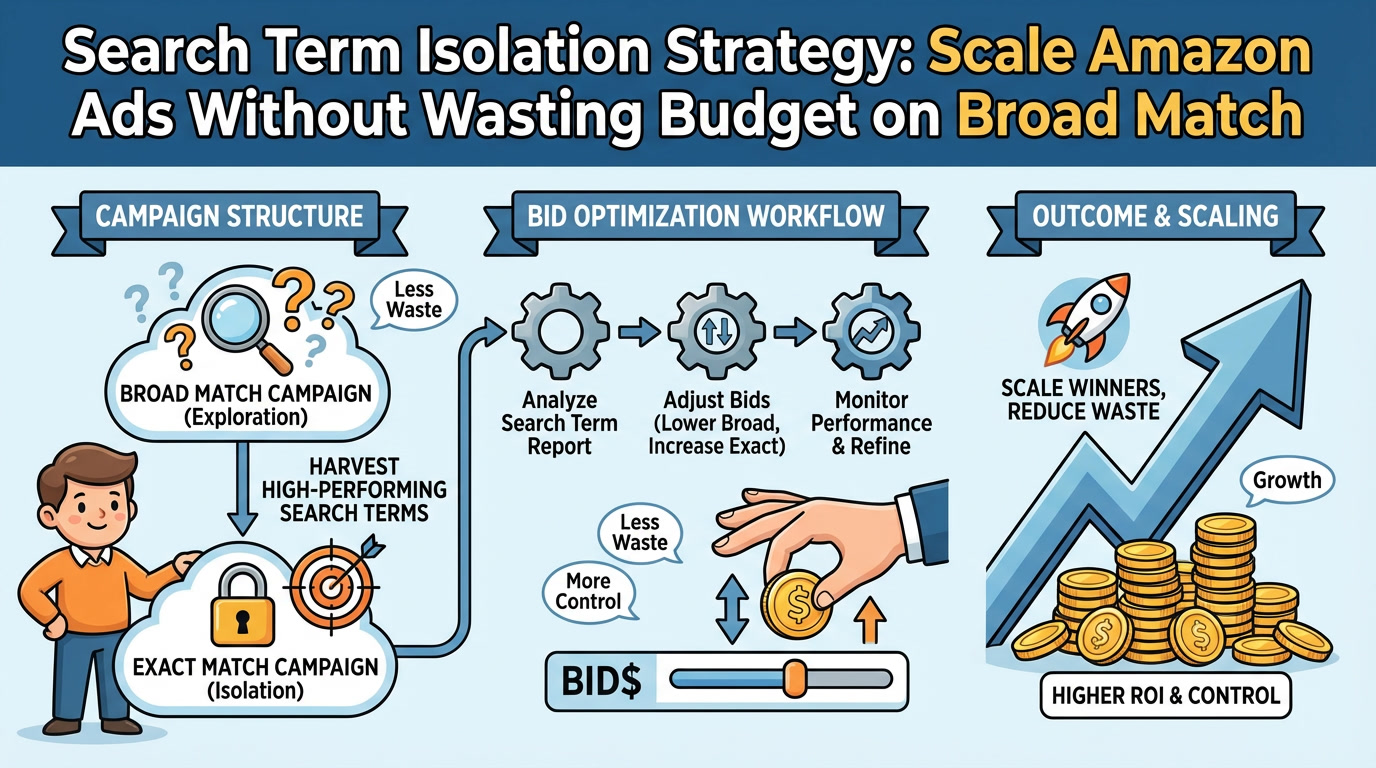Most 7-figure Amazon sellers waste money building in-house PPC teams. In-house specialists cost $75K-$150K annually plus tools and training time. Specialized agencies deliver faster results at lower total cost through proven systems, cross-brand insights, and accountability—making them the profit-smart choice for sellers planning exits. This is the real core of the Amazon PPC agency vs in-house decision.
Introduction: Amazon PPC agency vs in-house
Last month I audited a brand doing $3.2M annually.
They'd just hired an in-house PPC specialist. Paid him $85K. Bought him $12K in software subscriptions. Gave him three months to "get up to speed."
His first quarter? TACoS climbed from 18% to 26%.
That's $67,000 in additional ad waste. In 90 days.
The owner asked me: "Should I have just hired an agency?"
That’s the question behind every Amazon PPC agency vs in-house debate.
Here's what I told him.
The In-House Fantasy vs. Reality
You're doing seven figures. Your PPC spend is significant. And you're thinking: "I should bring this in-house. Get someone who breathes my brand. Full control."
Sounds smart.
Until you see the actual numbers — and evaluate Amazon PPC agency vs in-house costs side by side.
What In-House Really Costs:
Salary for a decent Amazon PPC specialist? $54K to $87K annually. Top performers command $100K+ ZipRecruiter.
But that's just the start.
Add payroll taxes (7.65%), benefits ($10K-$15K), software subscriptions for bid management and analytics ($8K-$15K annually), and the three-month learning curve where they're figuring out your catalog while your TACoS bleeds.
Real total cost: $75K to $150K per year.
For one person.
What You Actually Get:
One brain. One perspective. One set of experiences.
They're stuck in a rapidly changing field where finding deep expertise is extremely challenging Hiring an Amazon PPC Specialist: In-House vs. Agency Solutions. Amazon updates its ad platform constantly. Your in-house person learns from your account alone.
When they take vacation, you're flying blind.
When they quit (and they will—agencies poach top talent constantly), you start over.
I've seen this movie. It doesn't end well.
What Agencies Actually Deliver (When They're Good)
Let me be clear: most Amazon PPC agencies are trash.
They'll take your money, run auto campaigns, and send you pretty reports while your profit evaporates.
But a good agency? Different game entirely.
Here's What Changes:
You get platform-wide data exposure from managing diverse client accounts, early access to beta programs and new advertising features, specialized team members dedicated to tracking emerging strategies, and direct relationships with Amazon representatives Amazon PPC Management: Agency vs In-House vs Hybrid (2025).
You're not paying for one person's knowledge. You're accessing an entire team's collective intelligence across dozens of seven-figure brands.
I manage over $4M in monthly ad spend across multiple accounts. Every optimization I discover in one brand gets tested across the portfolio. That knowledge compounds.
Your in-house person? They're learning on your dime. Alone.
The Math That Matters:
Average monthly spend on PPC agency services runs around $5,800 PPC Pricing: What Does It Cost In 2025?. That's $69,600 annually—often less than a single in-house specialist when you factor in real total costs.
Agencies win the cost-to-profit ratio, especially in the Amazon PPC agency vs in-house decision.
For that, you get a team, not a person. Proven systems, not guesswork. Accountability, not excuses.
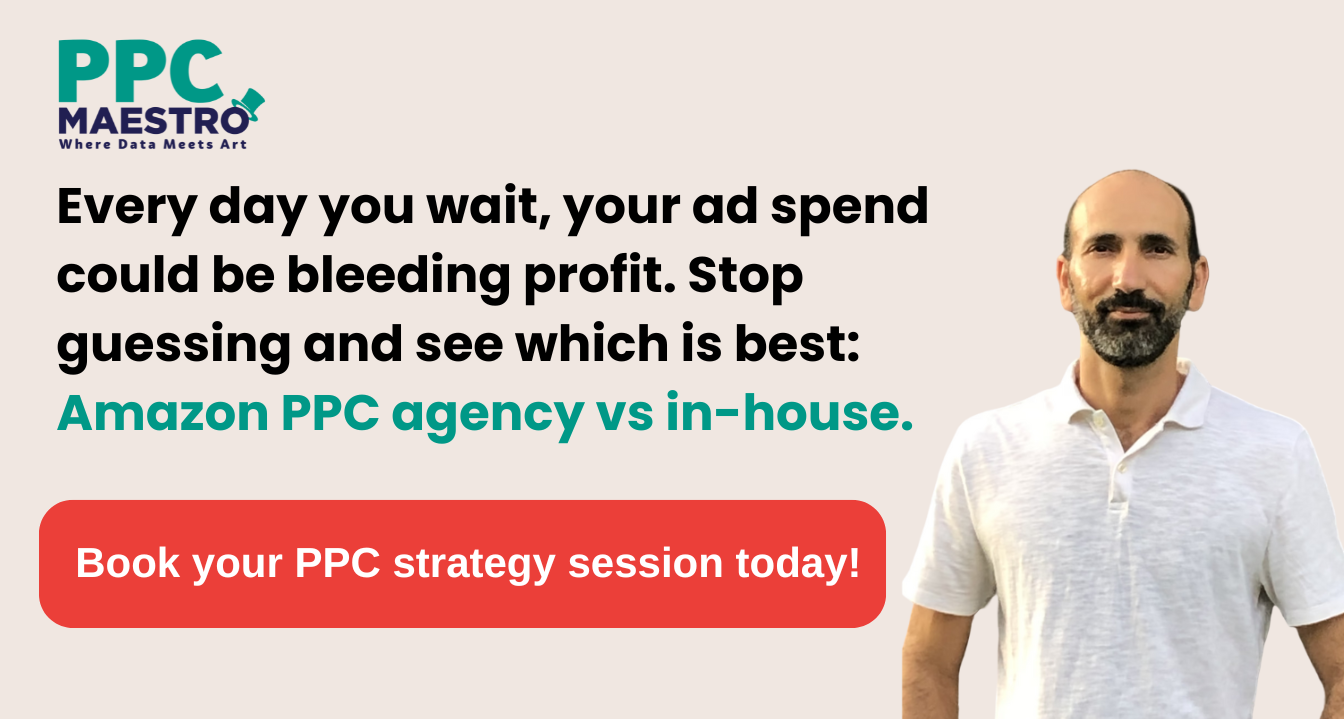
Amazon PPC Software vs Agency vs In-House: Which Actually Grows Your Profit?
When evaluating amazon ppc software vs agency vs in-house management, the decision comes down to three very different cost structures, skill requirements, and profit outcomes. Here's how each option stacks up for Amazon sellers.
PPC Software Tools (Perpetua, Pacvue, Teikametrics): Automation platforms excel at bid adjustments and reporting, but they execute rules — they don't think strategically. Software won't diagnose why your TACoS is creeping up or restructure your campaign architecture when something breaks. Budget $500–$2,000/month, plus the salary of someone skilled enough to interpret the data and act on it. Software is a tool, not a strategy.
In-House PPC Manager: Hiring internally gives you full control and brand continuity. The catch? Amazon PPC specialists with real expertise command $60,000–$90,000/year — before tools, training, and the 6-month ramp-up cost. One bad hire can sink an entire peak selling season. In-house makes sense only when your ad spend justifies a dedicated full-time role.
Amazon PPC Agency: A specialist agency brings battle-tested strategy, a team of experts across multiple account types, and no fixed overhead. The right agency doesn't just manage bids — they build a profit system tuned to your specific ASIN mix, competitive landscape, and margin targets. For most 7-figure sellers, an agency delivers the fastest path to a lower TACoS without the risk of a mis-hire or the ceiling of a single employee's expertise.
The bottom line: software alone rarely moves the needle, in-house works when volume justifies the fixed cost, and a specialist agency is the highest-leverage option for brands serious about profitable Amazon growth.
The Only Question That Matters: Who Lowers Your TACoS?
Forget the agency vs. in-house debate for a second.
Ask yourself this: Who's going to help you actually make more profit?
TACoS is Your Truth Metric
I don't care about your ACoS. I care about your TACoS.
TACoS (Total Advertising Cost of Sale) measures your ad spend against total revenue—both paid and organic sales What Is Amazon TACoS? Total Advertising Cost of Sale in 2023 - Jungle Scout. It's the only metric that tells you if your advertising actually drives profit or just burns cash.
TACoS under 10% is excellent. 10-20% is workable. Above 20%? You're overdependent on paid ads and your margins are suffering Amazon TACoS Explained - Master Your E-commerce Ad Spend - Getida.
I audited a brand last quarter spending $42K monthly on PPC. ACoS looked decent at 28%. Owner thought everything was fine.
Then we calculated TACoS: 34%.
For every three dollars in revenue, they spent over a dollar on ads. That's not a business. That's a slow bleed.
We cut their monthly spend to $31K, restructured their campaigns, and killed the waste. Six months later? TACoS at 16%, total revenue up 23%.
That's an extra $180K in annual profit. Because we focused on the right metric.
→ Want to know your real TACoS?Use my free calculator to see how much you're actually wasting.
Real Talk: When In-House Actually Works
I'm not going to lie to you. In-house can work.
But only in specific situations — and only when the Amazon PPC agency vs in-house framework tilts clearly toward internal capability.
You Should Build In-House If:
You're doing $10M+ annually with strong margins (30%+)
You can afford $120K+ for an elite specialist, not an entry-level hire
You have time for a 6-month ramp-up with zero results pressure
You're building a full e-commerce team (not just one PPC person alone)
You have internal infrastructure to support them (data, reporting, strategy)
That's maybe 5% of sellers.
Everyone else? You're paying for an expensive education that benefits your future competitors when your hire moves on.
When an Agency Makes You More Money
For brands generating $10K to $1.5M in monthly revenue, partnering with a specialized Amazon PPC agency offers the optimal balance of expertise, technology, and cost-effectiveness Amazon PPC Management: Agency vs In-House vs Hybrid (2025).
An Agency Makes Sense When:
You want to focus on product development, not babysitting ad campaigns
You need proven systems, not trial-and-error learning
You're planning an exit in 12-24 months and need clean, profitable metrics
You've wasted money before and want accountability
You value speed—you need results in weeks, not quarters
You're tired of watching TACoS climb while agencies give you excuses
Most seven-figure sellers I work with fall into this camp.
They didn't build brands to become Amazon PPC experts. They built brands to sell products and make profit.
Let specialists handle the technical optimization while you scale the business.
The Red Flags Nobody Talks About
Walk away immediately if they:
Won't explain their fee structure in detail (hiding costs)
Pitch the same strategy for every brand (cookie-cutter garbage)
Talk only about ACoS, never about TACoS or profit (vanity metrics)
Refuse to share detailed performance data (what are they hiding?)
Manage 50+ accounts with one account manager (you'll get ignored)
I've audited accounts coming from these agencies. It's always the same story: wasted spend, no strategy, pretty reports that mean nothing.
In-House Red Flags:
Run if your candidate: Has never managed a 7-figure Amazon account, doesn't talk about TACoS or profit, relies on 'auto campaigns' or 'keyword bidding alone' as their strategy, can't explain advanced campaign structures.
Talks about clicks and impressions without mentioning profit
Has only worked for one brand or in one category
Can't explain how paid ads drive organic ranking
Doesn't know what TACoS is or why it matters
Has unrealistic salary demands that strain your budget
These hires burn money while learning at your expense.
My Framework: Making the Decision

Stop overthinking it.
Ask yourself the real Amazon PPC agency vs in-house questions.
Budget Reality Check:
What's your real budget for PPC management? Include everything—salary, tools, training, backup coverage. If it's under $100K total, agency is your move.
Timeline Pressure:
Are you planning an exit in 12-24 months? Then you need clean profit metrics fast. No time for 6-month learning curves.
Control vs. Results:
Do you want control, or do you want profit? Sometimes you can't have both. Most successful sellers choose profit.
Trust Factor:
Have you been burned by agencies before? Valid concern. But choosing in-house out of fear instead of strategy is still the wrong move.
The answer for most 7-figure private label sellers is simple: specialized agency with transparent reporting and profit-first systems.
You get results faster. Cost less total. And you can focus on building the business instead of managing campaigns.
What to Do Next
If you're leaning toward an agency, here's your move:
Get proposals from 3-4 agencies. But don't ask about their process.
Ask about their results.
Specifically: "Show me a case study where you lowered TACoS while maintaining or growing revenue for a brand similar to mine."
If they can't show you the numbers, walk away.
If you're still considering in-house, budget realistically. Total cost for a skilled specialist with tools and training: $100K+ annually. Anything less and you're hiring someone learning on your dime.
Either way, start tracking your TACoS today. It's the only metric that shows whether your PPC actually makes you money or just looks busy.
Ready to see how much you're wasting?
→ Use my free Wasted Ad Spend Calculator
→ Watch this case study where we cut TACoS from 24% to 11% in 90 days
→ Apply for a free Profit Audit if you're spending $20K+ monthly on Amazon PPC
Your profit margins are too important to guess. Let's fix this.
FAQs
Q1: Why is my TACoS so high even though my agency says my ACoS is good?
Your agency is lying to you. Well, not lying—but focusing on the wrong metric. ACoS only measures ad-attributed sales. TACoS includes your organic sales too. If your TACoS is climbing while ACoS stays flat, your ads aren't driving organic ranking growth. They're just burning money without compounding benefits. A good agency tracks TACoS first, ACoS second. Anyone focusing only on ACoS either doesn't understand profitability or doesn't want you to see the real numbers.
Q2: How much should I expect to pay for Amazon PPC management?
In-house costs $75K-$150K annually when you factor in salary, benefits, tools, and training. Agencies typically charge $3K-$10K monthly ($36K-$120K annually) depending on your ad spend level. But here's what matters: cost per result. I've seen $120K in-house hires deliver worse TACoS than $5K/month agencies. Pay for results, not resumes. The cheapest option that doesn't lower your TACoS is the most expensive mistake you can make.
Q3: Can I start with an agency and bring it in-house later?
Sure. But why would you? This is backwards thinking. If an agency is driving profit, keep them. If they're not, fire them and find a better one. The "learn from agency then bring in-house" strategy means you're paying premium agency rates to train your future employee. Either hire in-house from day one and accept the learning curve, or commit to agency partnership for the long term. Trying to have it both ways wastes money on both ends.
Q4: What questions should I ask when vetting Amazon PPC agencies?
Stop asking about their process. Everyone claims to have a great process. Ask about results: "Show me a case study where you lowered TACoS while maintaining or growing revenue for a brand similar to mine." Then ask: "How do you handle wasted ad spend? What's your fee structure in detail? How often will we talk? What happens if TACoS increases instead of decreasing?" If they dodge these questions with vague answers, you're talking to the wrong agency.
Q5: Is it worth hiring in-house if I'm planning to sell my business in 12-24 months?
Absolutely not. You need clean profit metrics fast. An in-house hire needs 3-6 months to ramp up, during which your TACoS might climb. You can't afford that timeline. Agencies with proven systems can optimize immediately and deliver the lowered TACoS numbers buyers want to see. When you're selling, every percentage point of TACoS improvement increases your multiple. Don't waste exit prep time on in-house experiments.
